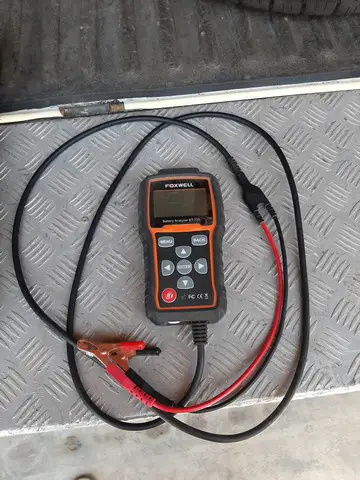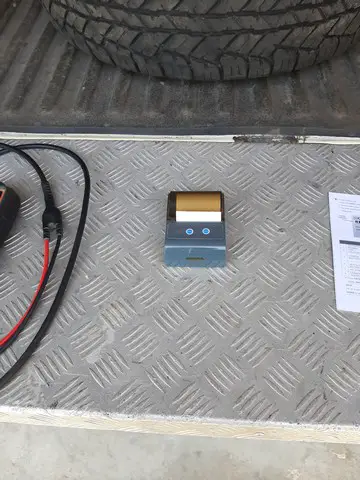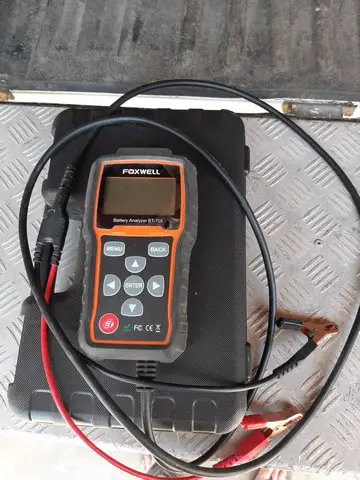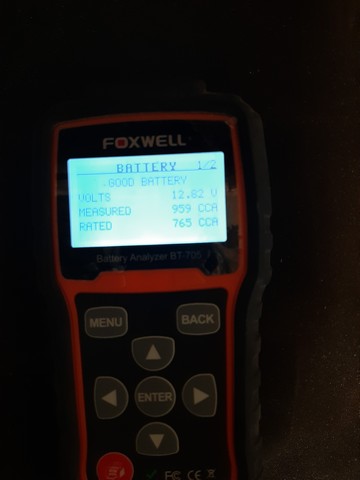Coming from the automotive diagnostics specialists, Foxwell, this is a simple-to-use tester that delivers comprehensive battery test results in just over three seconds.
A car battery load tester designed for 12v batteries, it also has the capacity to test the integrity of 24-volt battery charging systems.
Delivers Accurate Results
With a capacity of 100 through to 2000 cold-cranking amps, it’s suitable for larger SUVs and heavy-duty trucks. The CCAs are indicated in increments of one—leading to the most accurate reading, with no rounding up or down. In addition, whatever the battery in your vehicle, this tester will be compatible.
CCA from 100 to 2000 and deep cycle
Tests charging and cranking system
Simple to read LCD health status
Very easy to use car battery tester

A user-friendly easy to navigate menu system on the backlit LCD display takes you through all stages of the testing process.
You don’t have to refer to a manual to decipher the data. The screen indicates whether the battery is good, needs replacing or is losing power, etc. This is a useful feature if you struggle with understanding technical information.
The menu is controlled easily, through a flat keyboard. The lack of physically protruding keys means that this unit is completely sealed. Therefore, it is unlikely to be damaged by either water or oil penetration—making it a good choice for outdoor use.
This battery analyzer has extensive 7.8 foot, rubber-coated leads, which should protect against wear and corrosion. These leads culminate in gold-paint alligator clips. The length of the cable allows for moving around the vehicle when checking the cranking and charging system.
Five lines of data allow you to see all the battery status information at once, without switching screens.
While this tester has no inbuilt printer, it does have Bluetooth capabilities. Hence, details can be sent to a compatible Bluetooth device for either printing or digital storage.

The unit is slightly tapered to allow secure and comfortable handling. It is narrow enough to be gripped in one hand, leaving the other spare for attaching the cables to the terminals. Rubberized edging protects from damage, should the tester slip from your grasp.
Foxwell BT705 Specifications
Size 13 inches by 3.2 inches by 9.1 inches
Weight 3 pounds
Power Two lithium metal batteries
Battery Testing Voltage 12 volts
Operating Range 12 volts to 24 volts
CCA Range 100-2000 CCA
Battery Types Standard, gel cell, spiral wound, and flat plate
Cable Length 7.8 feet
Printer Optional Bluetooth
What Are the Benefits of the Foxwell BT705?
- Fast and efficient—delivering results within three seconds.
- Large 2000 CCA capacity.
- Water and oil resistant casing and keyboard.
- Will test both 12 volt and 24 volt batteries
- Cranking, start-up, and load-tester capabilities.
- Bluetooth connectivity for printing and/or storage.
- Ergonomically designed for safe handling.
- Six language options.
- “Real language” rating systems—no need to decipher data.
What Are the Drawbacks of the Foxwell BT705?
- The unit is difficult to place into the included carrying case.
- Requires an optional Bluetooth printer for physical documentation.


You May Also Like;
See our ZTS Battery Tester Review for household battery tester.
Why Do I Need a Car Battery Tester?
Theoretically, you don’t. If your car battery is working, the car will start—if it’s broken it will not. However, that’s similar to saying you woke up this morning and didn’t die during the night—so you must be healthy. Despite the fact, you smoke 40 cigarettes a day and dine daily on deep-fried donuts.
Using a car battery tester allows you to perform a “health check” on the battery—preventing and solving issues before they occur. Here are some key reasons to use a car battery tester.
CCA from 100 to 2000
Tests charging and cranking system
Easy to read large LCD health status
Very easy to use car battery tester
Checks Battery Health Status
Sadly, nothing lasts forever—including car batteries. Generally, they’re expected to have a life of around five years. But, depending on various factors, it can be longer or shorter than this.
Overcharging, living in a hot climate, draining the battery fully, and excess vibration due to untracked wheels can all shorten battery life. Inside the battery are plates that control the current.
Through constant use, they age. This means some of the plate material flakes off—reducing the power of the battery. At some point, they will give up altogether.
Battery testers can allow you to check how your battery is coping with old age. You know whether to tolerate them for a little longer or prepare for a funeral.
Load Test Indicates Underlying Problems
If you turn the ignition and there’s no electrical power, what do you do? Probably the first thing to check is that the battery terminals are connected. If they are, you’re pretty much assured your battery is dead. It’s fairly simple to remove the battery, charge, and replace.
You turn the ignition and the car starts. Great. So off you go to the supermarket for your shopping, crank up the AC and listen to your tunes. After the groceries have been bought, you load up the car and turn on the ignition—it’s dead again.
In this scenario, it’s easy to assume that you need a new battery. But that may not be the case. Problems with the alternator (which charges the battery), a parasitic drain, or a short, could also be the cause. If the car battery tester indicates that the battery is in good form, it’s time to look elsewhere for the issue.
What to Look for in a Car Battery Tester
Car battery testers range from a basic voltage tester to a professional-grade diagnostic tool. The features you need in a tester depend on your battery type, vehicle size, and personal requirements. Here are the key characteristics you should consider.
Voltage
Most modern cars have 12-v batteries. Although to be fair, when fully charged, they should read at about 12.6 volts or higher.
However, many classic autos up to the mid-1950s ran on six volts. Additionally, cars such as the Volkswagen Beetle and Citroen 2CV kept this smaller voltage until the 1970s. So, if you have a vintage Chevy Bel Air on the drive, you may need to look for a tester with a six-volt capacity.
Cold Cranking Amps
Sometimes just referred to as “CAs” or “CCAs,” checking you have the correct cold cranking amp capability is important in selecting your tester. Here’s the technical bit.
CCAs refer to the number of amps a battery, at 32 degrees Fahrenheit, delivers for 30 seconds while maintaining 7.2 volts per individual cell. Exciting stuff, right?
Simply put, it’s how much power your car needs, to start in cold weather. Hence, while your battery may start in summer, it could fail in winter.
This number varies between different models. Therefore, it’s important to check that your battery tester is suitable for your vehicle’s battery. A standard size car battery will have a rating of around 500-700 CCAs. Large trucks can go over 1000 CCAs.
Also, it’s worth looking for a tester that allows you to test the load in increasing amp levels. This will provide you with a more accurate reading.
Battery Types
Batteries no longer all come in the same format. Some battery testers have the ability to check a wide range of battery types, such as standard, gel cell, and spiral wound. Others are more limited in scope.
Display
Choose a display that is as clear to read as possible, otherwise, you could be making an incorrect assessment of your battery’s condition. Also, consider where the tester is to be used. Strip lighting in garages can make some screens and displays unreadable—in which case some backlighting from the unit itself could be beneficial.
Build Quality
Battery testers are often balanced in precarious positions while you attach the clamps or contacts to the terminals. In these circumstances, they could fall to the floor and become damaged. Ideally, look for testers with a sturdy construction that will not break the first time they hit the ground.
Cable Length
Longer cables provide versatility and enable you to locate the unit safely, as referred to above. Additionally, car batteries can often be placed in awkward positions—long cables enable you to easily reach the terminals.
Also, if you are doing a “start test”, i.e. testing the power of the battery during ignition, long cables allow you to have the unit inside the vehicle.
Printing Ability
For either the professional or serious enthusiast. Some testers can create printed reports of the test results.
This can provide an accurate record of your tests—a useful feature for monitoring how your battery is performing over time. This can document clearly when your battery begins its slow decline.
Automotive battery tester CCA from 100 to 2000
Tests charging and cranking system
Easy to read large LCD health status
Very easy to use car battery tester
Best Car Battery Tester For The Money
I have been using the Foxwell BT 705 for well over a year now, on a variety of vehicles, and I can attest that it is a very reliable and robust product. It is easy to use, and the screen directions are intuitive.
The extra-long cables are really useful when you want to start the vehicle to carry out further diagnostics other than just the state of the battery. They enable you to be able to hold the unit in your hand while starting the vehicle from the driving seat.
Add to this the option of adding a Bluetooth printer and you have a very capable tool in your hands for not a lot of cash.
Last update on 2024-07-25 / Affiliate links / Images from Amazon Product Advertising API


